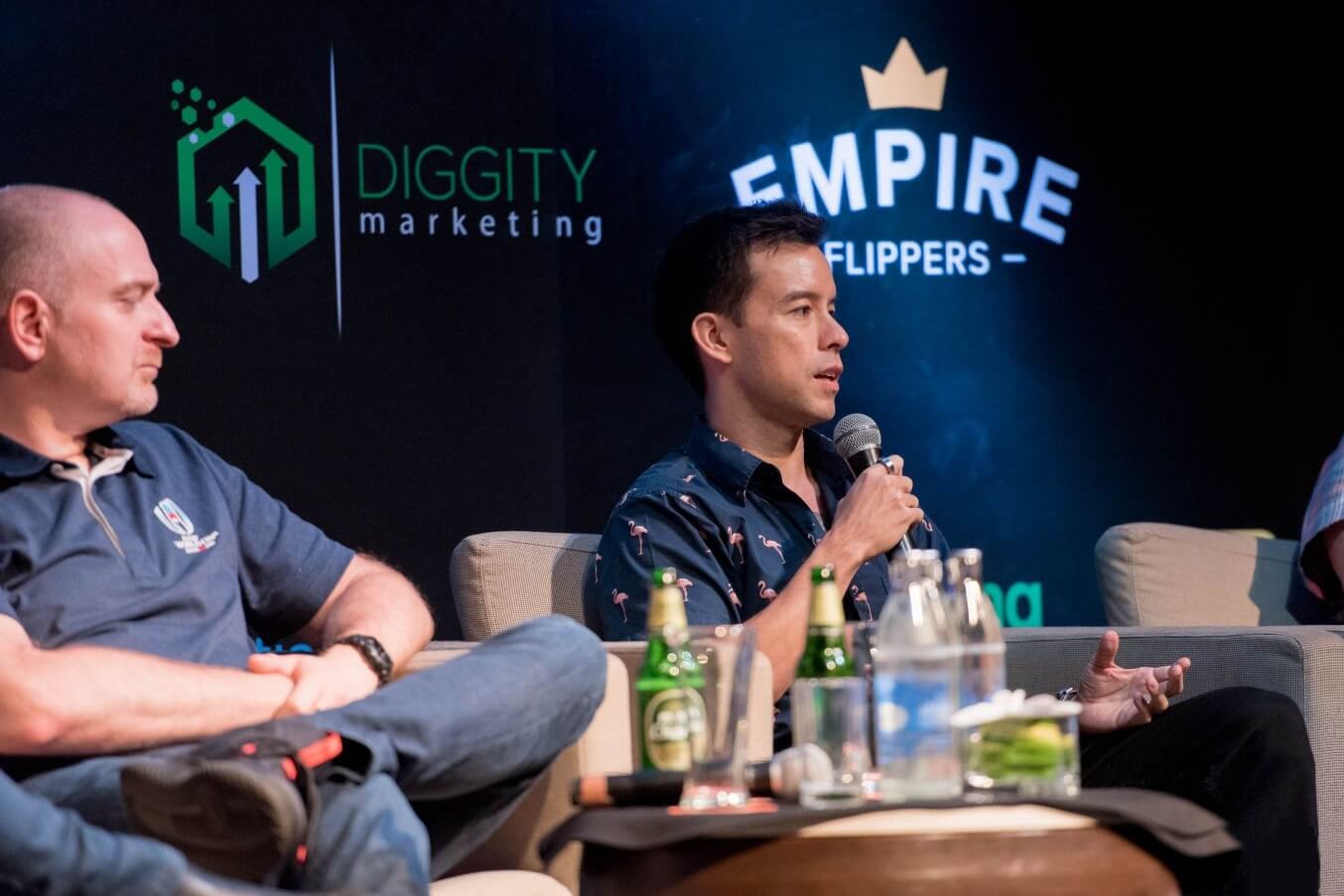Affiliate SEO marketing is one of the most popular ways of monetizing a website. And a great interview topic in our SEO experts series.
So, who is one of the most influential people in this field? Definitely Matt Diggity.
He replied to my email within a couple of hours and you can check out the result below. No fluff. Just actionable advice backed up by years of experience.
Let’s dive in…
What was it like starting out your first affiliate site?
I started with a course called The 30-Day Challenge. The concept was awesome. Every day they’d send you an email with one step in the process of creating an affiliate site.
By the 30th day, you should have created a dollar online.
It was super fun, and I did it with a group of people that had already had success with it, so I had confidence on my side.

Matt during the Chiang Mai SEO Conference 2019 – an event organized by him and his team.
Is it still possible to make money with an affiliate site? Isn’t the market oversaturated?
It’s absolutely possible. In fact, I believe that it’s the best SEO path to extreme “wealth” that exists right now (when compared to agency work, etc.).
Is it saturated? No.
You need to remember that the algorithm is getting tougher all the time. So it’s thinning out the herd quite often and causing people to quit. Those that stick around find that there’s less “real” competition than ever.
Micro niche sites vs. authority sites – what do you prefer and why?
A bit of both. But these days I’m on the side of authority sites more.
With authority sites, you can leverage the existing topical relevance and link equity of a massive domain that you’ve been adding to for a while.
Plus, these huge, branded, authority websites sell quite well on the market when you’re looking for an exit.
Matt Diggity: It’s absolutely possible to make money with an affiliate site. In fact, I believe that it’s the best SEO path to extreme “wealth” that exists right now.
Are there any niches you find more perspective than others?
Take the big three: health, wealth and relationships.
Then take one category step down from there. Examples:
- fitness
- personal finance
- dating
These are the niches that are evergreen.
How fast can you start earning a full-time income with a niche website?
If you’re starting from scratch with a brand new domain, give yourself at least 6-9 months to turn the corner into profitability.
As far as a full-time income, that depends on where you live, your expenses, etc… but give-or-take a year and a half.
Are there cases when the niche just doesn’t work for you? What are the signals to leave the project and try a different niche?
I don’t have that issue because I’m focusing on authority sites.
If I’m in “technology” for example, then I can write a topic about the “best smart doorbell”, for example. Let’s say that these doorbells never get fully adopted in the world, then I’m just out the cost of the content and maybe some links.
Choose your niche category high enough, and you’ll never have to be married to one micro-niche.
Would you recommend the Amazon Associates program or smaller affiliate networks? What are the pros and cons?
I almost always recommend non-Amazon.
Amazon converts well and it may be your only choice with most physical products, but their commission is notoriously low and they used to have a history of banning accounts with no mercy.
Direct relationships and typical CPA networks will give you higher commissions and let you get away with more on the conversion side of things.

What’s the best way to get traffic in the initial stages of a niche site?
I’m all about SEO, baby.
Go for those low hanging fruit long-tail keywords at the beginning. If you’ve built a decent site and your onsite SEO is good, you should rank for some stuff right out the gate.
Once you get some traffic, that’s your foothold.
Link building – white hat, gray hat, black hat? What’s your position in this everlasting argument?
This argument is a WASTE OF TIME. It’s a vocabulary debate, not an SEO debate.
Depending on who you ask, black hat might be any effort to build links. Pure white hats should let links come in naturally. Others might think white hat is getting links from real websites.
Who cares? Make a decision that you’re comfortable within your business and run with it.
As for me?
I’ll pay for links because the ROI is better than spending the time to get them. I’ll also leverage PBNs.
You’re part of the Authority Builders team which provides white hat guest posts. Can a backlink be “white hat” if you pay for it?
With guest posting, you’re either paying for the link with the content you’re providing or money.
What’s the line? To the purists, both are wrong.
The fact of the matter is that the entire internet pays for links in one way or another. It’s your job as an SEO to cover these tracks, whether you’re a “white hat” or not.
We take care of that at Authority Builders.
Any other link-building technique that works great for you?
Link insertions. Using outreach to get links in existing articles that already have links going to them.
Basically, you should take it past the stage of figuring out what “website” you want a link from, and actually look at the exact “article” you want a link from.
Then you reach out to that site owner and ask for a link in that article, in exchange for… whatever works (*cough* money is usually what it takes these days).
These are excellent for ranking power.
Matt Diggity: Choose your niche category high enough, and you’ll never have to be married to one micro-niche.
How do you distribute the links when doing link building? What’s the ratio of linking to the “money pages” vs supporting content?
I don’t distinguish.
I’ll look at the competition on page one to see what the average number of links is, direct to the ranking URLs.
Content is king. Do you agree?
Absolutely. I feel strongly that content is the primary ranking factor and data-driven content is the future.
Tip: Check out Matt’s advice for SEO beginners in our roundup featuring more than 30 SEO experts from all around the world!

Do you recommend content outsourcing? If yes, what platform is the best to find a writer?
Absolutely! I’m using SEO Butler and also private writers that I find in various Facebook groups.
What posting frequency would you recommend when starting a niche site?
Don’t go too crazy. What I recommend is getting a base of 10 or so interlinked and topically clustered pages for your starting set.
Then posting 1-2 times per month till you jump out the sandbox.
What are 3 things you would recommend to an SEO beginner starting his/her own niche site?
- Get some help. There are online courses (mine is The Affiliate Lab) and there are also some free resources online as well.
- Take action. Experience is your best teacher.
- Don’t take shortcuts. Quality all the way when it comes to your content and links.
How do you stay motivated when working on a new project that doesn’t bring results immediately?
You get used to it. I like to work on more projects simultaneously so that I can jump between them if I’m bored with one of them.
That’s why we (referring to my affiliate agency LeadSpring) have multiple projects always moving in the pipeline, so we can focus on the fun ones when they’re ready.
Who would you recommend following in the niche site industry? Who are your heroes?
- Authority Hacker – Great podcast.
- Spencer Haws – Has an awesome follow-along case study
- Gareth Daine – Same as above, with the case study.
What blog post made you “wow” recently?
This one: How Is NLP Changing The Way We Do On-Page SEO in 2020?
Finally, let’s play a little game. Never have I ever:
- Sent an outreach email with the wrong recipient’s name in the greeting: Probably 1000 times.
- Published a post I am embarrassed about now: Not really. Nothing embarrassing. Social media is another story.
- Spent more than $1,000 on a single backlink: Sure have!
Matt Diggity @mattdiggityseo
Matt Diggity is a CEO and founder of Diggity Marketing, affiliate expert, blogger, keynote speaker and a result-oriented SEO with years of experience.
He works on several projects (many of them mentioned in the interview), organizes an SEO conference and loves to back up all of his SEO techniques by thorough testing.
Currently, he lives in Chiang Mai, Thailand.





